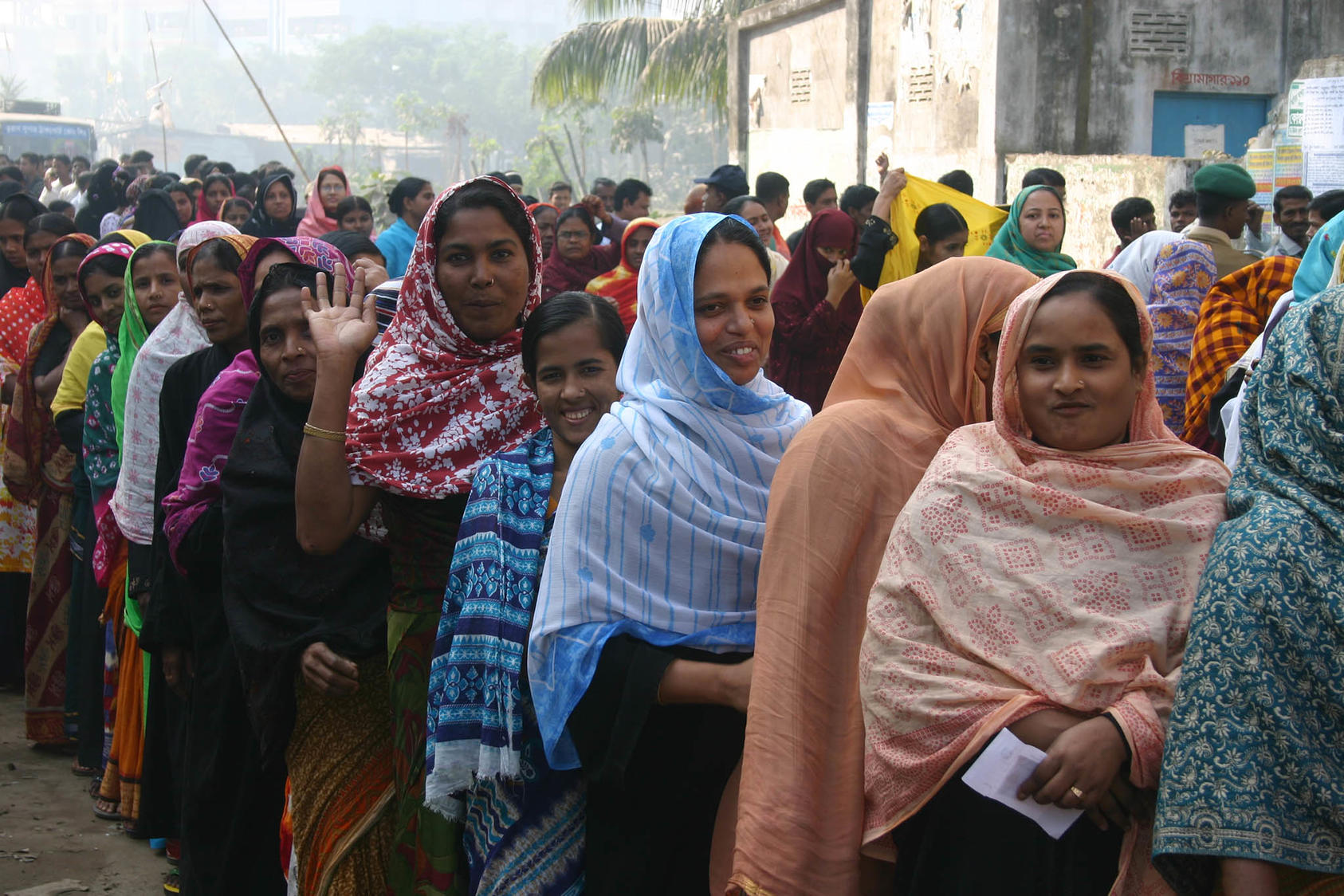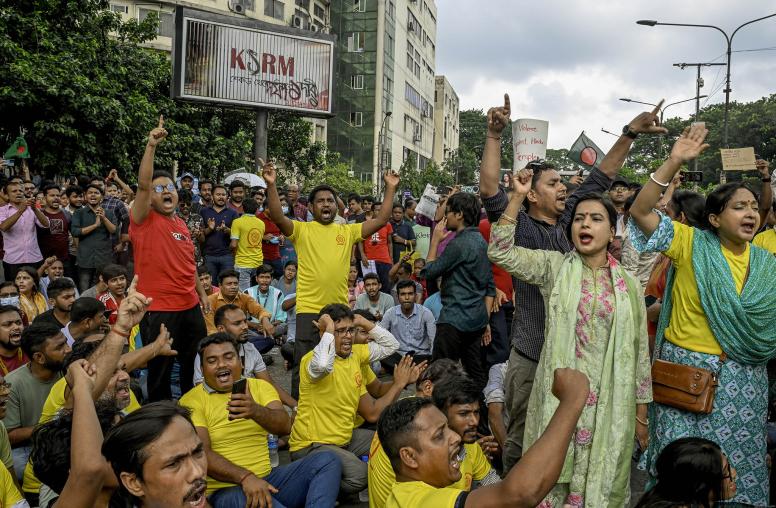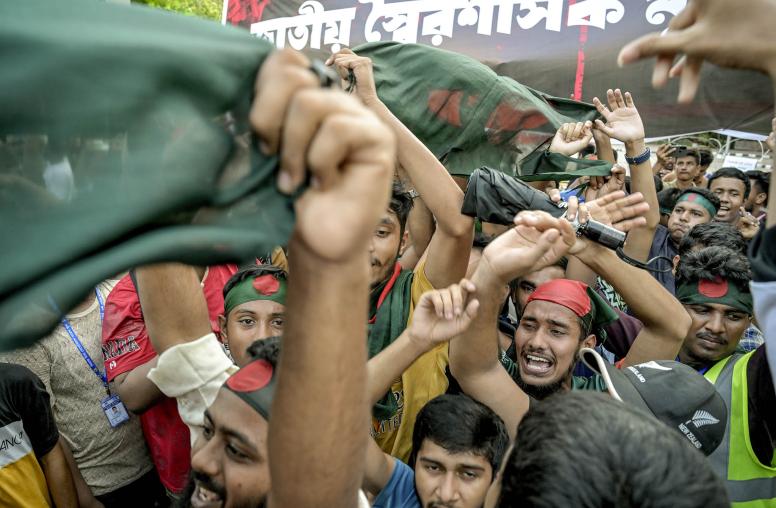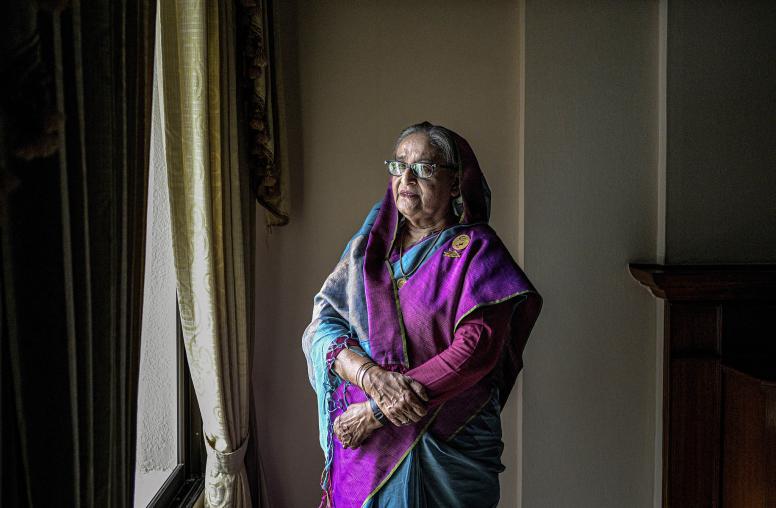Three Things to Watch as Bangladesh’s National Election Season Heats Up
It’s been 15 years since Bangladesh had an election that was widely considered legitimate — it needs one now to reset its political system.
Bangladesh is increasingly recognized as an important player in Indo-Pacific competition, but its tumultuous domestic politics are now drawing attention with parliamentary elections due by January 2024. Economic crisis and opposition mobilization threaten to unseat the ruling Awami League (AL), which faces escalating American pressure to prove its democratic credentials after 15 years in power. The primary opposition party, the Bangladesh Nationalist Party (BNP), is currently boycotting the next national contest until Bangladesh’s election administration is reformed. On the streets, violence is rising between and within parties while voter disillusion has grown amid years of political intransigence.

With about six months to go before the next parliamentary election, these are three key issues to watch.
1. How will the election be administered?
There is a political stalemate over Bangladesh’s election administration. The AL asserts that elections can be free and fair under the oversight of the Bangladesh Election Commission, which the opposition argues is partisan. Consequently, the BNP says it will boycott all elections until the government reinstates Bangladesh’s caretaker government (CTG) system, scrapped by the AL in 2011.
Under the CTG system, a nonpartisan interim government takes over election administration and other governmental functions within 90 days of election day to ensure a level playing field. A CTG successfully oversaw three elections in Bangladesh — 1991, 1996 and 2001 — but became increasingly controversial over time. In 1996, the incumbent BNP resisted installing a CTG for the election that February, prompting an opposition boycott and a second election four months later under a newly codified CTG system. In 2006, the incumbent BNP’s manipulation of CTG rules sparked political paralysis and ultimately military intervention that lasted two years.
When the military restored civilian rule in 2008, the CTG system was on shaky ground. Following the AL’s win that December and a controversial supreme court decision that deemed the CTG unconstitutional, the AL eliminated the system in 2011. Since this point, the BNP has called for its return, which the AL has refused.
To forestall debate about reinstating the CTG system, the AL government has employed two strategies.
The first strategy is to prove that political conditions are open and elections are fair under the election commission. AL supporters point to the BNP’s massive Dhaka rally in December 2022 and other opposition political events held unmolested around the country. In 2022, non-AL candidates won in local elections, lending credibility to the process. Recent municipal elections have encountered some problems but have also been lauded for relatively high turnout, reduced violence and open competition in some locations. Furthermore, the government has consistently said it welcomes international election observers in January.
Despite this, opposition supporters point to violence and obstruction that tilt the election environment in the AL’s favor. Local media have documented numerous instances of seemingly unprovoked violence against opposition members and supporters. The BNP claims thousands of its members are facing politically motivated court cases and jail sentences including its secretary-general, chairperson and exiled acting chairperson. Transportation companies have called strikes suspiciously timed with BNP rallies, effectively impeding party supporters from attending. The BNP argues that these actions mirror the dynamics of the 2018 national election, in which independent groups found fraud, and that electoral participation is pointless.
The AL’s second strategy is to entice the BNP with a compromise short of the CTG’s return. Rumors persist about quiet negotiations on political guarantees to end the BNP’s boycott. In May, the AL floated the idea of a bipartisan election time government including the BNP. A senior AL official recently said the party is open to internationally mediated political dialogue, but this was quickly rolled back. Neither side currently seems willing to budge publicly, but the potential for backchannel negotiations will continue.
2. How strong is the opposition?
The public popularity and internal cohesion of the BNP are not clear.
For a country of 170 million people, there is remarkably little credible public opinion data in Bangladesh. Most observers’ assessment of political strength is driven by impressions of grassroots enthusiasm and crowd size at rallies, which are highly unreliable measures. By this metric, the opposition appears to be growing in popularity. Its rallies before the COVID-19 pandemic often inspired sparse attendance, but now draw thousands — at times tens of thousands. While some in the party are concerned that its rallies peaked too early, the BNP looks more popular today than it has in years.
The BNP also faces internal challenges with a split between its leadership in Dhaka and its acting party chairperson Tarque Rahman in London — exiled since 2008 — who has been de facto party head since Khaleda Zia’s imprisonment in 2018. The BNP denies rumors of internal conflict over strategy and decision making, but they persist. While the BNP is currently holding firm on its electoral boycott, since 2014 the party has vacillated between strategies of political abstention and participation and often struggled to bring along party members in its decisions.
The BNP’s boycott of the 2014 parliamentary election, which it enforced with violence, is now commonly viewed as a mistake that cost the party power and popularity. In the lead up to the 2018 parliamentary elections, the BNP again threatened to boycott but reversed course and participated, only to have many candidates withdraw before polls closed. After winning only six seats amid electoral irregularities, the party initially said it would boycott swearing in its victorious members of Parliament (MPs), but, facing internal dissent, backed down and then competed in elections in 2020.
By 2021, the BNP was back to boycotting elections, and in December 2022 the party announced that its seven MPs would resign from parliament. Yet cracks are again emerging in this strategy.
One of the BNP’s resigned MPs, Abdus Sattar Bhuiyan, ran for and won his own open seat as an independent, defying his former party. This June, hundreds of BNP candidates are running as independents in city council and mayoral elections against the party’s wishes. The BNP has disciplined and even ejected some of these rebellious members, but it is clear that many in the BNP want to join elections even under the current election commission.
To boost its democratic legitimacy, the AL is eager for the BNP’s participation and has sought to encourage these defectors. Elections that have featured former BNP members running as independents have been notably free, often resulting in their victory. In Sattar’s reelection bid as an independent MP, the AL cleared the field of serious opposition, ensuring his win. A potential election time unity government is yet another incentive for BNP participation. These carrots to induce BNP defections are testing the party’s internal unity.
3. What is the impact of American pressure?
The United States has centered democracy promotion in its Bangladesh policy. In December 2021, Washington sanctioned Bangladesh’s elite security force the Rapid Action Battalion (RAB) over alleged extrajudicial killings and other human rights violations. The Biden administration denied Bangladesh an invitation to its 2021 and 2023 global democracy summits. And in May 2023, the United States announced it would refuse visas to any Bangladeshi implicated in “undermining the democratic election process in Bangladesh.”
Over the past year, several senior U.S. government officials — including Secretary of State Antony Blinken, U.S. Ambassador to Bangladesh Peter Hass and State Department Councilor Derek Chollet — have publicly called for free and fair elections in Bangladesh.
Other governments have followed the United States’ lead. The United Kingdom, Japan and others have echoed U.S. calls for better elections and the European Union is planning an assessment mission and possible election observation for January.
These actions and statements have gotten significant attention in Bangladesh. The political opposition and rights groups have cheered the United States and others, while the AL has ping-ponged between openness, dismissal and hostility. Some Bangladesh government officials have acknowledged abuses of the country’s controversial Digital Security Act and limited RAB excesses, and pledged to improve Bangladesh’s still relatively nascent democratic institutions. At the same time, others in the AL, including the prime minister herself, have flatly denied any human rights abuses, called the United States hypocritical, and accused the Biden administration of plotting to overthrow Bangladesh’s government.
Importantly, the AL’s pushback against the United States is supported in Delhi. India has unfailingly praised Sheikh Hasina and views the AL as a vital ally in Bangladesh. In January, a former minister from India’s ruling party said in Dhaka that India has “its own view on Sheikh Hasina,” who is “fighting for the country’s democracy.” In February, India's external affairs secretary told Sheikh Hasina, “We have total support to you and your leadership.” For India, Bangladesh’s status quo suits it well. For its part, China has fostered close economic and defense cooperation with Sheikh Hasina’s government while remaining politically neutral.
The AL insists that it already plans for free and fair elections, so U.S. pressure is not needed. However, it is widely believed that American sanctions on the RAB effectively changed its behavior, and that continued pressure for free and fair elections could constrain Bangladesh’s violent zero-sum politics over the next six months. Yet the United States’ broader geopolitical interests in South Asia, which include cultivating a close relationship with India, could militate against American democracy promotion in Bangladesh growing much more forceful in the coming months. Indeed, then Deputy Secretary of State Stephen Biegun said in 2020 that the United States sees Bangladesh as a “key partner in the Indo-Pacific” and a “centerpiece of our work in the region.”
The Importance of Bangladesh’s Next National Election
The structure of Bangladesh’s election administration, the strength of the political opposition, and the role of U.S. pressure will be key issues to watch in advance of Bangladesh’s highly consequential election. Bangladesh has not held a national election widely accepted as legitimate by all sides since December 2008. If 2024 goes awry, another five years of deeply polarized and often violent political competition could await Bangladesh until the next parliamentary contest occurs. Regardless of who wins this winter, Bangladesh needs an acceptable election to reset its political system and restore Bangladeshis faith in their representative institutions.
Internationally, the United States, India and China will be watching closely. Bangladesh’s long border with India, strategic location on the Bay of Bengal and economic potential make it an attractive ally for Indo-Pacific competitors. But a contentious election that yields political instability and disputed leadership could imperil its economic growth and geopolitical rise.



